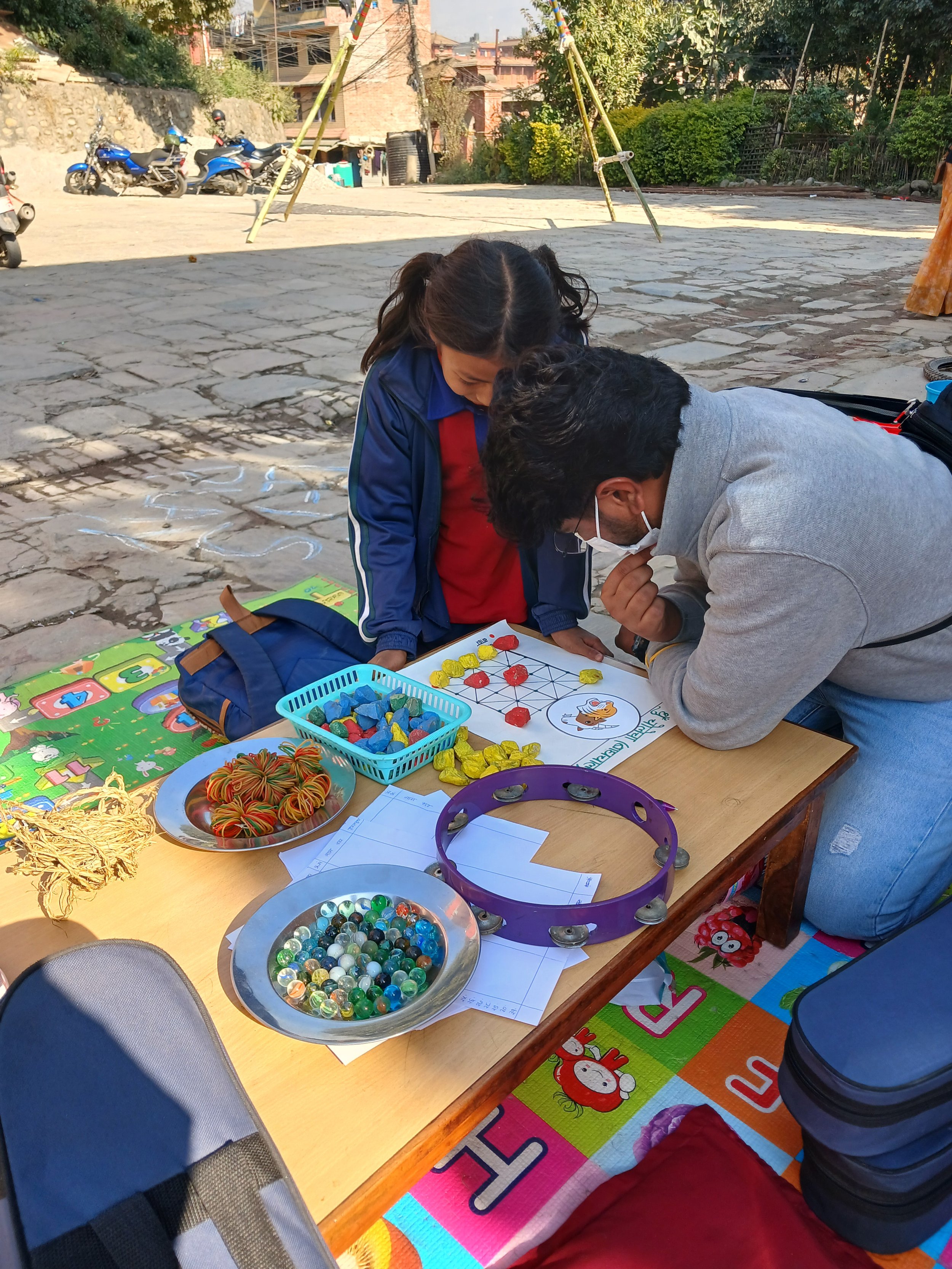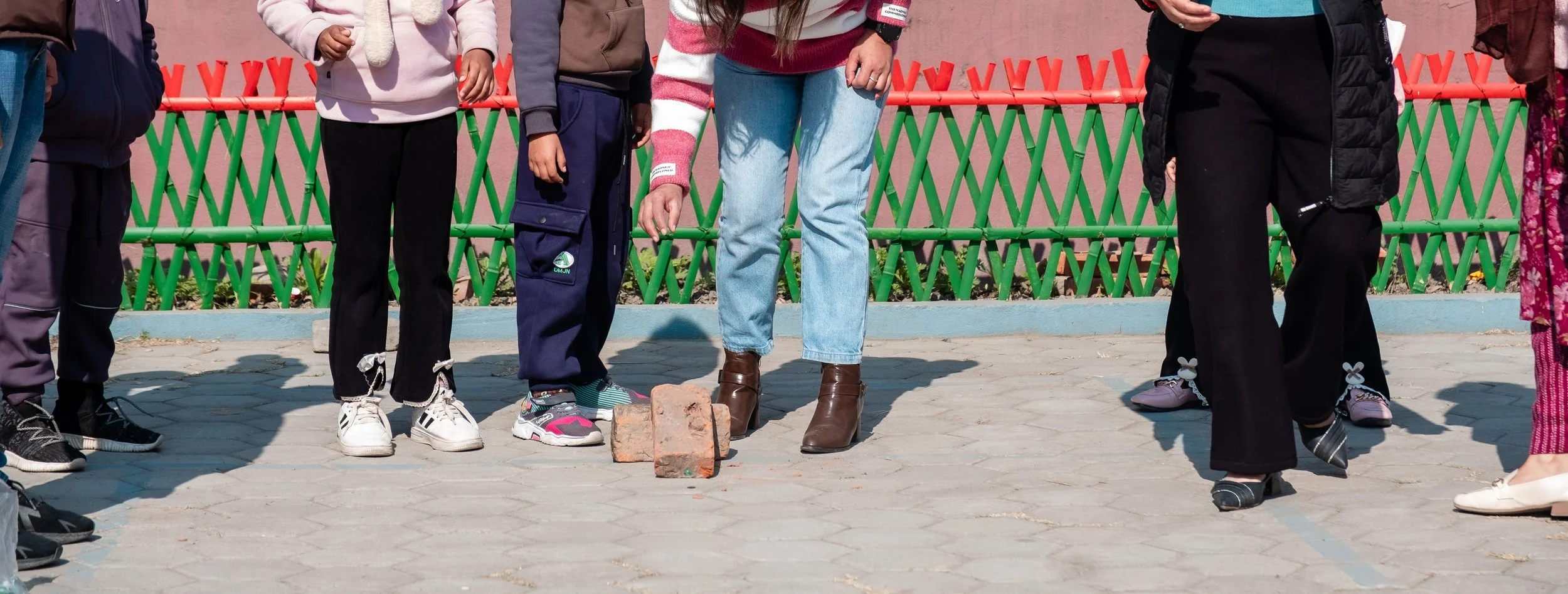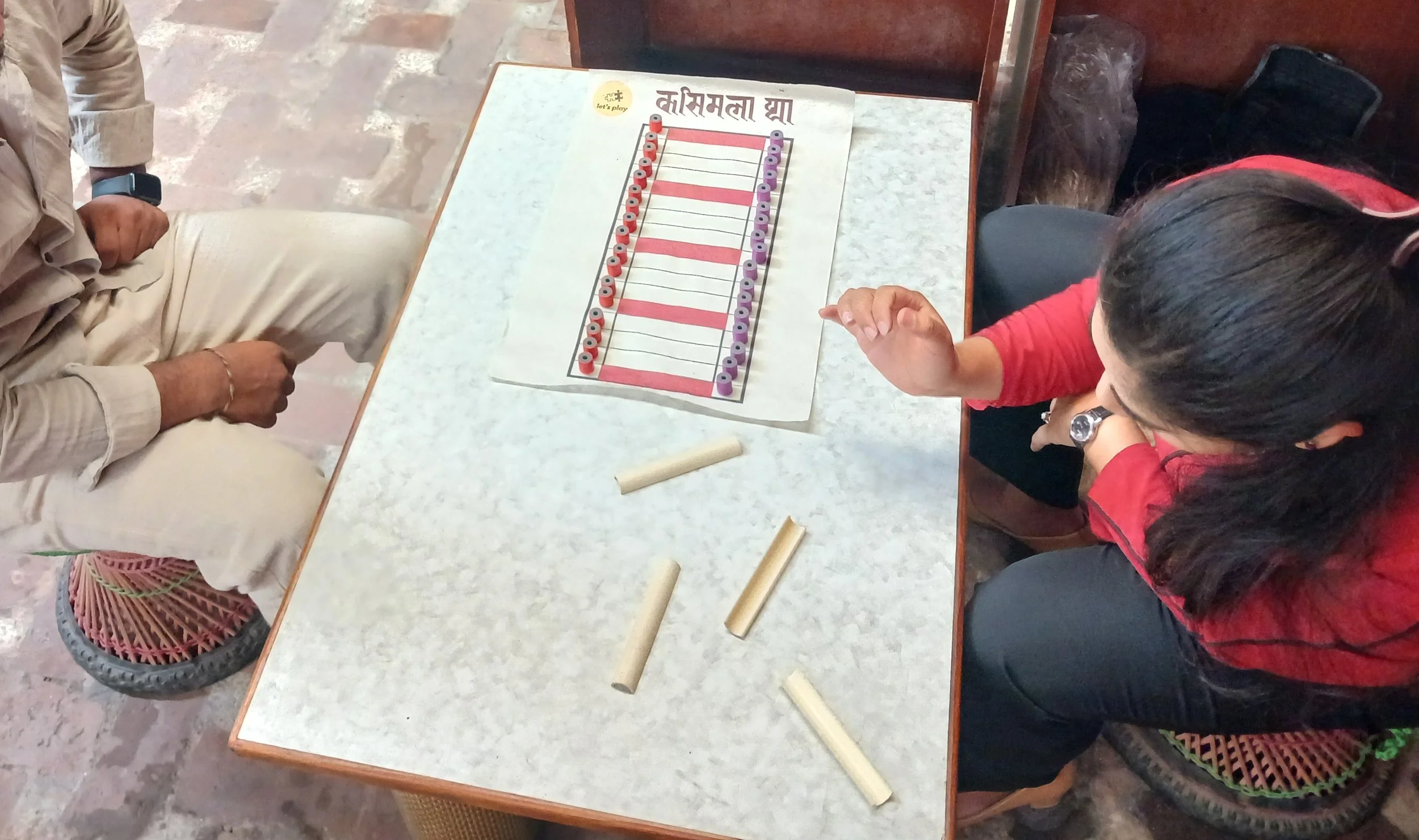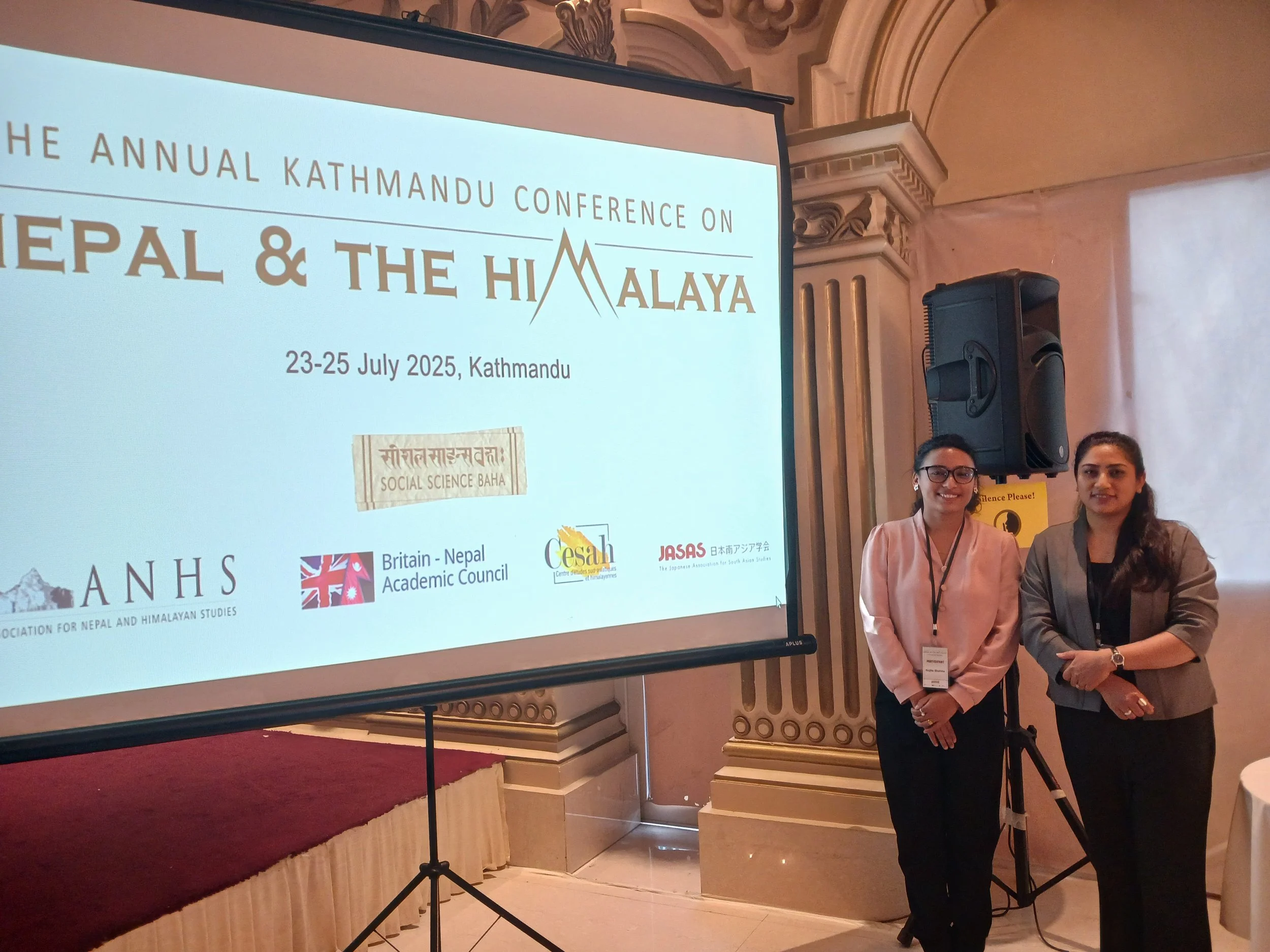Partners: Let’s Play Initiative Nepal (LPIN), Zero One Studio, Krija Bajracharya
December 2024
In collaboration with Bhaktapur Municipality, Bal Vikas English Secondary School and Laxmi Cares
This outreach project in Bhaktapur, Nepal, documented and revived traditional games through collaborations with Heritage as Placemaking, Bhaktapur Municipality, Bal Vikas English Secondary School, and Laxmi Cares of Laxmi Sunrise Bank. In partnership with Zero One Studio and illustrator Krija Bajracharya, the team developed visual documentation, tutorial videos, awareness videos, and a comprehensive game manual and curriculum. Activities included a five-day presence at Bhaktapur Mahotsav, a winter camp for schoolchildren, parent engagement sessions, and citywide outreach through the Orange Vibe event. The project trained facilitators, promoted gender-inclusive play, and presented findings at “The Annual Kathmandu Conference on Nepal and the Himalaya”, ensuring these games remain a living part of Bhaktapur’s cultural identity.
Looking ahead, the project plans to expand its impact through “Book-Free Fridays” in schools of Kathmandu Metropolitan, regular play-based sessions at the community, child-friendly space co-design, tactical urbanism pilots, and an open-source digital archive of traditional games.
Traditional games serve as a vital bridge connecting children to their cultural roots, teaching them the values, stories, and traditions of the past. Their simplicity and ease of access show that play and learning are things that everyone can do, no matter their social, cultural, or economic background (Maftuh & Ariesta, 2020).
However, with the rise of digital technologies, children are increasingly drawn toward online videos and games, often resulting in reduced social interaction and greater isolation (Kacar & Ayaz-Alkaya, 2022). The situation is getting worse because there are fewer safe places to play, as many traditional open spaces are becoming more crowded with parked vehicles (Space for play is being ‘designed-out’ of urban childhoods ). In Nepal, traditional settlements were historically designed to encourage communal activities, fostering social well-being through shared public spaces. Bhaktapur exemplifies this approach, with games traditionally played in courtyards (Chowk/Nani), temple complexes, rest houses (Pati/Falcha), platforms (Dabali), and under trees (Chautara).
Modernisation and digital gaming have led to the decline of these traditional games, date their recognition in the National Sports Development Act-2077 (Rising Nepal Daily, 2022). Today, many traditional games are only played during festivals or as part of teacher led school activities. Some traditional games have already been lost to contemporary play culture due to a lack of documentation and a faint oral tradition tells of their prior existence; they cannot be recovered. Preserving these games is not only essential for cultural continuity but also provides children with opportunities for physical, social, emotional, and cognitive development.
Bhaktapur Mahotsav 2024: Bringing Traditional Play Back to Life
From December 13–17, 2024, the Let’s Play Initiative Nepal (LPIN) team participated in the Children’s Section of Bhaktapur Mahotsav. Our goal was to document, teach, and revive traditional games that have shaped generations, fostered friendships, and strengthened neighbourhoods.
We collaborated with four teachers; Rina Timila from Genuine English Secondary School, Rabina Duwal from Bal Vikas English Secondary School, Sunita Gosain from Khowpring English Academy and Sujata Shakya from Everest English Secondary School to prepare a description of locally played games. We received assistance from heritage enthusiasts, municipal leader; Mr. Dipendra Prajapati, teachers, and the curriculum book Khwopa ko Pahichan. An estimated 2500 children from 94 different schools visited our stall for five days, learning traditional and today not very commonly played games such as dori, guchcha, ghwai, baghchaal, and chungi. Many children tried the games on the spot and left eager to learn new ones and teach others. During the Mahotsav coin games, puzzles, and musical cushions were among the extra activities that kept children interested and we were able to introduce most students to games they had never played before.
Teachers and parents also reminisced about the games they played as children and frequently suggested that future school events be organised with similar themes.
Several teachers are discussing local variations and traditions of games at Bhaktapur Mahotsav. Photo Courtesy of LPIN. Photograph by: Rojita Sharma
Let’s Play volunteer and a child from Bhaktapur are playing the Baghchal game. Photo Courtesy of LPIN. Photograph by : Rojita Sharma
Winter Camp at Bal Vikash English Secondary School: Play and family bonding
We participated in a five-day winter camp at Bal Vikash English Secondary School on January 7, 2025 which involved play-based activities for the entire day for students in upper kindergarten through fifth grade. Even in games that are typically thought of as "for the other gender," boys and girls equally participated in the enthusiastic learning and playing of guchcha, dori, ghwai, and chungi. A special gatti session was conducted with an emphasis on hand-eye coordination, as many children initially struggled to safely catch the stone.
Kids and teachers learning to play guchcha (marble game). Photo Courtesy of Zero One Studio. Photograph by: Susan Machamasi
An interactive session with parents and guardians at Winter Camp. Photo Courtesy of LPIN. Photograph by: Susan Chakradhar
On the final day, we facilitated an open discussion with parents and guardians to gather their views on play and learning. Parents highlighted the importance of play-based and nature-based approaches, the revival of traditional and sensory games to boost cognitive development, and the significance of playing with children to strengthen family bonds.
Further research, a meeting with the author of ‘ Jhigu Kasa’, a book of traditional games
We met Mr Panna Ratna Maharjan, the author of Jhigu Kasa, at his home to gain deeper insights into the games featured in his book. He urged us to develop a digital platform to make these games more accessible to younger generations. As a key stakeholder, Mr Maharjan was instrumental in helping us revisit oral stories and improve the narratives used in documenting the games.
Training the Trainers
Learning the Kasimala Pya game with the help of a school teacher also a heritage enthusiast, Sabin Duwal. Photo Courtesy of LPIN. Photograph by: Rojita Sharma
We held an informal training session on Kasimala Pya and Baghchal at a local café, led by a teacher from Khwopa ko Pahichan, in order to maintain the revival of traditional games. This approach encourages intergenerational learning by enabling skilled facilitators to teach games at public gatherings, winter camps, and schools.
Orange Vibe Outreach: A Citywide Celebration
An interaction between kids and parents while playing gatti. Photo Courtesy of LPIN. Photograph by: Rojita Sharma
We expanded our outreach to the Orange Vibe event on April 25th, 2025, hosted by Laxmi Cares, a social initiative of Laxmi Sunrise Bank. Over five hundred children and parents from diverse backgrounds participated, learning about the nearly forgotten traditional games of Bhaktapur. Parents were eager to reintroduce children’s play in the city's natural terrain.
Kids playing Ghwai in the courtyard of Bode. Photo Courtesy of LPIN. Photograph by: Rojita Sharma
Presented the findings of the’Let’s play’ outreach project at “The annual Kathmandu conference on Nepal and the Himalaya. Photo by: Suji Hyongo
We developed a handbook for kids and teachers as a curriculum resource and hands-on learning guide for Khwopa ko Pahichan to ensure a lasting impact of the project. The handbook supports Kathmandu Metropolitan City's "Book-Free Friday" initiative by providing a teaching tool for schools, aiming to empower the next generation of players. The handbook teaches skills and knowledge to continue playing these traditional games. Additionally, we created a playkit in a playbag that includes all items and instructions to play six games. The playbags also hold QR codes linking to our tutorial videos for additional learning.
Looking Ahead
The excitement we witnessed among children, parents, and teachers shows that Bhaktapur’s rich tradition of play is now being preserved and actively lived once again. Our next steps include expanding to reach out to more schools with the program. We plan to secure more funds and organise community-led play events. With a fully developed tool kit, a website and with a lot more experience, we are now in the position to collaborate with further municipalities and NGOs to incorporate traditional games into regular classroom instruction in many more places across the Kathmandu Valley and hopefully one day beyond..
We want to express our gratitude to all the schools, children, parents, who participated in this programme and to all community members who gave their time. Alongside the passionate volunteers and numerous local educators who embraced the spirit of play, special thanks are extended to Krija Bajracharya from Bhaktapur Municipality, Bal Vikas English Secondary School, Zero One Studio, and Laxmi Cares of Laxmi Sunrise Bank and Dr. Stefanie Lotter, PI of Heritage as Placemaking.
References
https://www.ucl.ac.uk/news/2025/sep/space-play-being-designed-out-urban-childhoods?utm. (n.d.). Space for play is being ‘designed-out’ of urban childhoods.
Kacar, D., & Ayaz-Alkaya, S. (October 2022). The effect of traditional children's games on internet addiction, social skills and stress level. National Library of Medicine.
Maftuh, B., & Ariesta, F. W. (June 2020). Traditional Games as a Multicultural Education Planning for Children in Primary Schools. Jurnal Inovasi Pendidikan Dasar.








